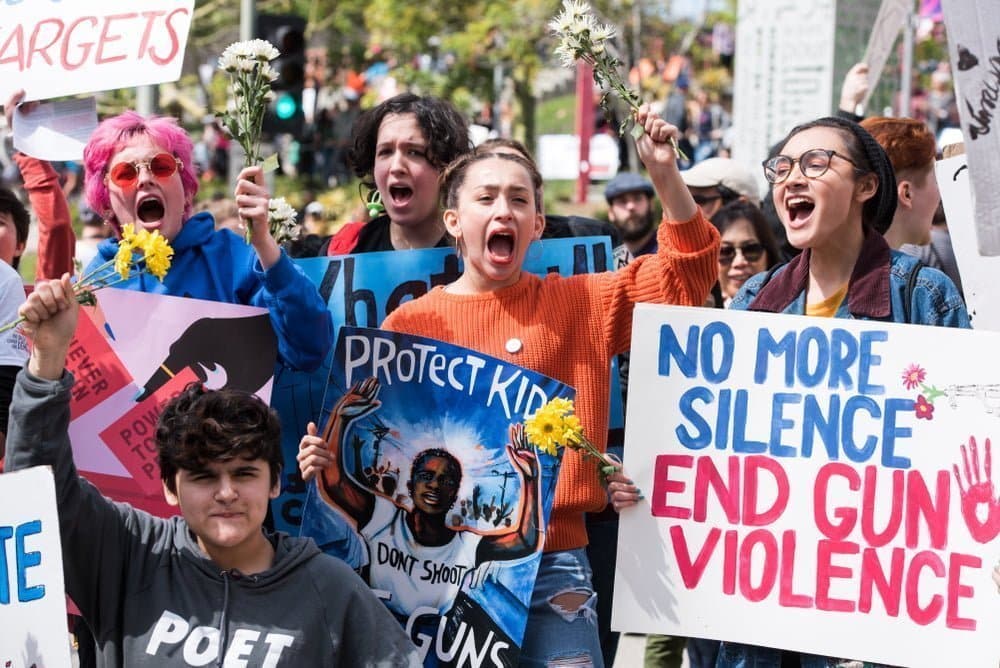The United States continues to declare women and children as disposable people.
The 5th U.S. Circuit Court of Appeals ruled Thursday that the Second Amendment guarantees the rights of individuals to own firearms – even if a person was required by the state to surrender their guns pursuant to a protection order for domestic violence. And while that Court’s jurisdiction is Texas, Louisiana, and Mississippi, the decision is concerning advocates for survivors of domestic violence across the country, including in Bucks County.
“It’s terrifying!” Marianne Lynch, executive director of A Woman’s Place, told the Bucks County Beacon. She went on to explain that like Texas, “Pennsylvania has a law against this. Title 23, passed in 2019, requires everyone with an adjudicated Protection from Abuse (PFA) order to relinquish their weapons.” A Woman’s Place is Bucks County’s sole domestic violence response agency.
The Pennsylvania Coalition Against Domestic Violence announced it was also “alarmed” by the decision.
“The United States v. Rahimi ruling sets dangerous precedent and will undoubtedly compromise the safety of victims and survivors of domestic violence and the communities in which they live,” PCADV said in a statement.
Its website summarizes the Pennsylvania legislation (which is covered by the U.S. Court of Appeals 3rd Circuit). Basically, the law requires that in addition to all adjudicated PFAs, people found guilty of misdemeanor domestic violence crimes must also surrender their weapons. Title 23 likewise prohibits the storage of weapons with casual associates. This changes who those weapons might be surrendered to once the court has ruled. Prior to the 2019 law, one could give their weapons to a family member for safe keeping. No longer acceptable, Pennsylvania requires all guns be turned over to county law enforcement, a commercial armory, or the defendant’s attorney. In an effort to warn victims of domestic abuse, the law also requires that plaintiffs be notified if and when the weapons are returned.
The 5th Circuit Court based their decision on a 2022 U.S. Supreme Court ruling, New York State Rifle and Pistol Inc v. Bruen: a case challenging New York laws restricting an individual’s right to a concealed carry permit. At first glance, the Bruen case doesn’t seem related to this latest appeal launched in Texas by Zachey Rahimi, a man found guilty of possessing guns after a restraining order required him to surrender them. While the substance of the cases is different, the appellate judges used the Bruen ruling, authored by Justice Clarence Thomas, to vacate Rahimi’s conviction and rule the law unconstitutional. Thomas wrote that restricting a person’s right to “an armed self-defense” violated that person’s second amendment rights. The ruling went on to state that any law passed after the ratification of the second amendment (1791) or its application to the states (1868) would meet a similar fate to the New York law.
The Rahimi ruling in Texas appears to prove Thomas’s point. All laws passed after 1868 will be struck down – at least by the conservative, like-minded appellate courts – and potentially by the current U.S. Supreme Court.
Meanwhile, A Woman’s Place’s Lynch wants to know what that means for the Pennsylvania’s Title 23. “What does this do to the PA law? I can’t imagine law enforcement who have to respond to domestic violence calls will welcome this. Will our law remain in effect while Merrick Garland appeals this?” In a statement from the U.S. Attorney General’s office Thursday, Garland did promise a “review” of the ruling based on a decades old determination that “a person who is subject to a court order that restrains him or her from threatening an intimate partner or child cannot lawfully possess a firearm.” He continued, “Whether analyzed through the lens of the Supreme Court precedent or the text, history and tradition of the Second Amendment, that statute is constitutional.”
But, could this ruling lead to an elimination of Title 23?
“Potentially,” responds Pennsylvania attorney and retired juvenile defender Ron Turo. Turo believes that if the case is appealed to the U.S. Supreme Court and the Justices agree to hear it, “There would be a really good argument to say that a similar statute in Pennsylvania or any state could also be unconstitutional.”
READ: The US Supreme Court Intends To Dismantle Democracy
The Bucks County District Attorney’s office is less concerned. In a statement issued by the DA’s Director of Communications Manuel Gamiz Jr., the Chief of Appeals believes that because the PA law is less broad than the one overturned by the 5th district, Title 23 might better withstand a challenge, “Pennsylvania’s PFA law gives the issuing Court the power to decide whether or not to command relinquishment and thus requires a finding of necessity for each individual rather than a blanket prohibition for all subject to PFA Orders.”
In Lynch’s mind all these statements and judicial handwringing mean only two things to victims of domestic violence in Bucks County, increased confusion over the law and the potential for more harm. Lynch worries that perpetrators will hear about the ruling and use it as just another excuse to ignore Title 23. “We already have non-compliance issues with people who are supposed to relinquish their weapons. And we know that 54% of female homicide victims are killed with a gun.” Lynch cautions, “Of those women killed with a gun, 2/3 were killed by their intimate partner.”
Lynch relies heavily on statistics to support her advocacy. She believes you can’t argue with facts when they’re so stark and deadly. Statistically, three women die every single day. But more to Lynch’s point, in 2019 alone, 112 of those murdered were in Pennsylvania. One could argue that without Pennsylvania’s Title 23 those stats might be even higher.
READ: Gen Z Women Will Save Our Democracy
The numbers that really keep Lynch up at night? The ones in Bucks County. “We served 1,374 clients in matters involving protection from abuse, criminal proceedings against abusers, custody and support cases between July 1, 2021, and June 30, 2022,” she said.
It’s a big job. Lynch fears that rulings like the one in Texas will only embolden the people with a potential for violence; those A Woman’s Place works so hard to keep from harming their clients. “The presence of a gun in the home makes it much easier to become victims of violence,” added Lynch.
When asked what precautions A Woman’s Place might put in place following this ruling, Lynch responded, “For our staff, we have protections in place that operate all the time to keep them safe, so I am not additionally concerned – not more so than usual. Our Safe House is in an undisclosed location, and we work extremely hard to keep it that way. We don’t respond to police calls directly but are available for clients after the crisis and we work within the courts, which don’t allow weapons.”
The people Lynch is concerned about aren’t just the hundred or so people they shelter each night, it’s the people who aren’t in shelter yet. Lynch explained her concern for victims who are unable to free themselves from their situations, “We also work with clients in safety planning so we know that even with the laws, there still can be and often are weapons that haven’t been relinquished so we help survivors plan around that.”
Lynch’s last reminder – victims of domestic violence may call A Woman’s Place 24/7. “If you or someone you know needs help, please call 1.800.220.8116.”







